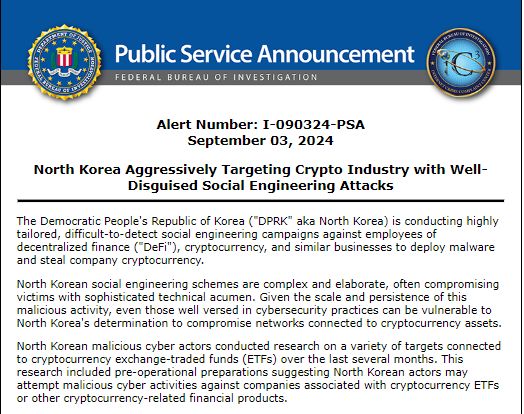In a new wave of cybercrime activity, the Federal Bureau of Investigation (FBI) has issued a Public Service Announcement (PSA) warning that North Korean hackers are intensifying efforts to steal funds from U.S. cryptocurrency exchange-traded funds (ETFs). These hacking attempts are part of a broader strategy employed by North Korean cyber actors to exploit the growing cryptocurrency industry, particularly by using advanced social engineering tactics to manipulate employees and gain unauthorized access to company assets.

Over the past several months, an FBI investigation has uncovered a series of coordinated cyberattacks directed at crypto ETF companies, as well as other entities associated with cryptocurrency-related financial products. The agency’s alert shines a spotlight on the increasing sophistication of these attacks, raising concerns about the potential risks faced by the rapidly expanding crypto market.
The Evolving Threat of North Korean Hackers in the Crypto Space
North Korea has a long history of cybercriminal activity, with state-sponsored hacking groups like Lazarus Group gaining notoriety for their involvement in major cyber heists. In recent years, these hackers have turned their attention to the cryptocurrency space, exploiting the decentralized nature and high market volatility of digital currencies to fund the regime’s activities.
According to the FBI, the latest attacks specifically target U.S.-based crypto ETFs. Crypto ETFs, like traditional ETFs, are financial products that allow investors to gain exposure to cryptocurrency without directly owning the assets. These funds, which have grown in popularity in recent years, manage large amounts of digital currency on behalf of their investors, making them attractive targets for cybercriminals.
The FBI’s warning highlights that North Korean hackers are employing sophisticated social engineering techniques to carry out these attacks. Social engineering is a method of manipulating individuals into revealing confidential information, typically by exploiting human vulnerabilities rather than relying solely on technical hacking methods. The hackers have been refining their social engineering skills to infiltrate crypto-related firms and gain access to sensitive data or company funds.
Advanced Social Engineering Techniques
In the case of the targeted crypto ETF companies, North Korean hackers have used a variety of advanced social engineering techniques to try to deceive employees into granting them access to valuable assets. Some of the methods include:
- Personalized Scenarios: Hackers have crafted highly personalized phishing emails or messages that are specifically tailored to their victims. These messages often appear to be legitimate, referencing recent events or using details about the individual’s job, employer, or personal life to build trust and lower defenses.
- Impersonating Trusted Contacts: One of the most common tactics involves impersonating someone the victim knows and trusts, such as a colleague, business partner, or executive. By posing as a trusted contact, the hackers are able to convince employees to share sensitive information or approve unauthorized transactions.
- Faking Job Offers: Hackers have also been observed creating fake job offers as a means of luring victims into revealing confidential information. In some cases, attackers have posed as recruiters or high-profile companies, offering enticing roles to crypto industry professionals. Victims are asked to complete application forms or undergo interviews, during which they may unknowingly provide key details that hackers can use to compromise their company’s systems.
The FBI’s investigation revealed that these social engineering tactics are often combined with traditional cyberattacks, such as spear-phishing campaigns and malware distribution. Once hackers gain a foothold within a company’s network, they can launch more sophisticated attacks aimed at stealing cryptocurrency or gaining control of critical systems.
North Korean Interest in Cryptocurrency
North Korea’s interest in cryptocurrency is driven by a combination of economic need and the desire to evade international sanctions. As the regime faces growing financial isolation, cryptocurrency presents an attractive avenue for acquiring foreign currency, laundering funds, and bypassing restrictions on international trade.
In recent years, North Korean hackers have been implicated in several high-profile cryptocurrency heists. According to a report by Chainalysis, North Korean cybercriminals were responsible for stealing nearly $400 million worth of digital assets in 2021 alone. These funds are often used to support the regime’s weapons programs and fund illicit activities.
The current focus on U.S. crypto ETFs signals an evolution in North Korean cyber strategies, with hackers targeting more sophisticated financial products. While previous attacks were primarily directed at cryptocurrency exchanges and individual investors, ETFs represent a new frontier due to their growing popularity and the large amounts of capital they manage.
FBI Alert: A Call for Vigilance
In its Public Service Announcement, the FBI emphasized the need for crypto industry professionals, particularly those working with ETFs and other cryptocurrency-related financial products, to remain vigilant. The agency warned that North Korean cyber actors are likely to continue pursuing malicious activities against the crypto sector, leveraging a combination of social engineering and technical attacks.
The FBI’s alert outlined several recommendations for organizations to enhance their cybersecurity posture and defend against these emerging threats:
- Employee Training: The FBI advises companies to conduct regular cybersecurity training to raise awareness of social engineering tactics. Employees should be taught to recognize phishing attempts, verify the identity of contacts before sharing sensitive information, and avoid clicking on suspicious links or downloading attachments from unknown sources.
- Implement Multi-Factor Authentication (MFA): MFA can add an extra layer of protection by requiring users to provide multiple forms of verification before accessing sensitive systems or accounts. This makes it more difficult for hackers to gain unauthorized access, even if they successfully obtain a user’s credentials.
- Monitor Network Activity: Companies are encouraged to continuously monitor network activity for any signs of suspicious behavior. Unusual logins, unexpected file transfers, or changes in system configurations should be investigated immediately to prevent potential breaches.
- Segment Critical Systems: By segmenting critical systems from the rest of the network, companies can limit the damage in the event of a breach. This practice, known as network segmentation, ensures that even if hackers gain access to one part of the system, they are unable to reach other, more sensitive areas.
- Report Suspicious Activity: The FBI urged companies to report any suspicious cyber activity or attempted attacks to law enforcement as soon as possible. Prompt reporting allows authorities to investigate and potentially disrupt ongoing cyber operations, while also helping other organizations avoid similar threats.
The Implications for the Crypto Industry
The FBI’s warning underscores the growing cybersecurity risks faced by the cryptocurrency industry as it continues to expand. With the rapid adoption of digital assets and the increasing popularity of financial products like ETFs, the industry has become an attractive target for cybercriminals, including state-sponsored hacking groups like those from North Korea.
Personal Note From MEXC Team
Check out our MEXC trading page and find out what we have to offer! There are also a ton of interesting articles to get you up to speed with the crypto world. Lastly, join our MEXC Creators project and share your opinion about everything crypto! Happy trading! Learn about interoperability now!
Join MEXC and Get up to $10,000 Bonus!
Sign Up


